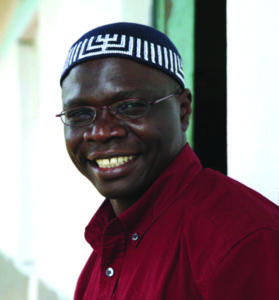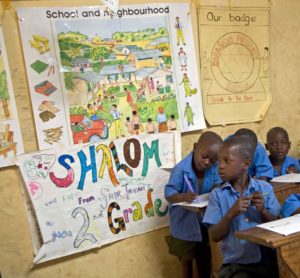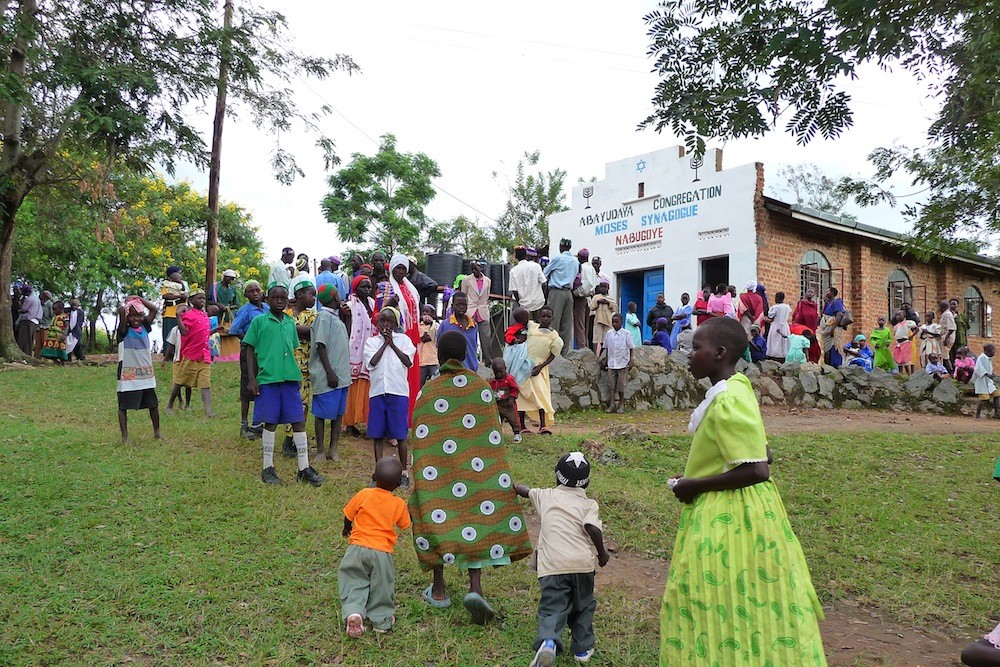 Rabbi Gershom Sizomu leads a community of 1,500 Jews. What’s remarkable about this is not the number of Jews in his community, but who they are and where they live. Rabbi Sizomu is the leader of the Abayudaya community—a group of Jews in the landlocked country of Uganda.
Rabbi Gershom Sizomu leads a community of 1,500 Jews. What’s remarkable about this is not the number of Jews in his community, but who they are and where they live. Rabbi Sizomu is the leader of the Abayudaya community—a group of Jews in the landlocked country of Uganda.
Uganda is perhaps most famous to the Western world for the brutal dictatorship of Idi Amin. Before Amin came to power there were around 3,000 Jews in Uganda. There are now around 1,500, but that number is growing again thanks to Rabbi Sizomu.
“My father was arrested for being Jewish,” Rabbi Sizomu said casually at lunch this past Friday.
He was here this past weekend as a guest of Adath Jeshurun Congregation, as part of an annual trip to the United States for the Be’chol Lashon Conference in San Francisco.
The Jewish community in Uganda started in the late 19th Century with a tribal leader named Semei Kakungulu. In the 1880s, Christian missionaries came to Uganda intending to convert people like Kakungulu to Christianity. They succeeded in their mission, but by 1919, Kakungulu had come to believe that the truth rested only in the first five books—what we Jews call the Torah. He started talking about circumcising his children. When told that this would make him like the Jews he declared, “Then I am a Jew!”
The Ugandan Jews thus have no genetic ties to the global Jewish community, but they keep kosher, observe Shabbat, and have a chief rabbi (Sizomu) officially ordained by the Conservative movement.
 Rabbi Sizomu said that being Jewish is all he has ever known. Both his grandfather and father were community leaders before him. He loves his family — he has a wife, Zipporah, and four children, pictures of whom he proudly displays on his iPad. He also cares deeply for his country; he ran for Parliament as a member of the opposition party in 2011 and says, half-joking, that North Africa and South Africa are not “real Africa.” Yet in Uganda, “The press is not free. The judiciary is not free. Parliament is not independent.” He wants to change that.
Rabbi Sizomu said that being Jewish is all he has ever known. Both his grandfather and father were community leaders before him. He loves his family — he has a wife, Zipporah, and four children, pictures of whom he proudly displays on his iPad. He also cares deeply for his country; he ran for Parliament as a member of the opposition party in 2011 and says, half-joking, that North Africa and South Africa are not “real Africa.” Yet in Uganda, “The press is not free. The judiciary is not free. Parliament is not independent.” He wants to change that.
But his primary concern is for the Ugandan Jews. Within their community of 1,500 there are five synagogues and eight distinct social groups. Rabbi Sizomu is the leader of all except one — a group that wants to make Aliyah to Israel and, according to the rabbi, believe that being Orthodox Jews will make the process easier.
The community’s main social initiative is a health clinic in the community, open to all Ugandans. The clinic has physicians and nurses on call 24 hours a day, it provides education for disease prevention, and annually distributes thousands of mosquito nets to anyone who needs one.
“In our community we have not lost anyone to Malaria in three years.” It’s obvious by the way he says this that Rabbi Sizomu is as proud of this as anything in his life. “We have many hopes for the clinic. We think it will encourage our community to go into the medical field; we think it will provide jobs, as well as health.”
 Right now the main synagogue in Uganda fits 200 people comfortably. Like many synagogues in America, the synagogue gets over twice that number for special events like High Holiday services. The Abayudaya are currently trying to raise money for a new synagogue. Rabbi Sizomu wants this new space to be a place that provides value for the community every day of the week, not just on Shabbat. He wants the new building to include a day care, a social hall, a school, office space, and a “store.”
Right now the main synagogue in Uganda fits 200 people comfortably. Like many synagogues in America, the synagogue gets over twice that number for special events like High Holiday services. The Abayudaya are currently trying to raise money for a new synagogue. Rabbi Sizomu wants this new space to be a place that provides value for the community every day of the week, not just on Shabbat. He wants the new building to include a day care, a social hall, a school, office space, and a “store.”
It seemed odd at first that this remote community would feel the need for a gift shop. But the rabbi meant something different. Uganda suffers from inclement weather patterns. Sometimes they don’t get enough rain for crops to grow, sometimes they get too much. Both of which result in famine-like conditions. Rabbi Sizomu wants a space to store grain and other excess crops from times of plenty, so that they have reserves for times of famine.
“Like Joseph,” he says.



